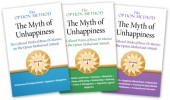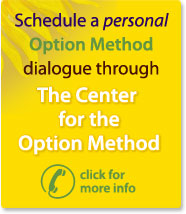Being tempted by what we want less/Staying in touch with what we want more
In this lecture, Bruce Di Marsico discusses more about how unhappiness is used (unnecessarily) to stay in touch with desires.
Wanting is more important to us than getting, because getting what we want is not guaranteed. For example, if I am single, and I want to be in a love relationship, my only hope of finding a partner is my wanting to find a partner, and getting a substitute (a platonic friend, for example) does not diminish my wanting.
“Needs” are wanting, combined with unhappiness. To stop the pain of needing, we could stop wanting, and so we become afraid of giving up wanting. For example, if I am single, and I feel that I need to be in a love relationship, then if I am not in a love relationship, I feel the apparent dilemma of either being single and needing a love relationship, or of giving up my wanting to be in a love relationship.
Our lesser desires tempt us to give up our greater desires. For example, my desire to not go on failed romantic dates tempts me to give up my desire for a love relationship. Our degree of unhappiness is in proportion to the temptation to stop wanting, and so the more failed romantic dates I go on, and the more unpleasant they are, the more unhappy I will be, as I become more strongly tempted to give up my desire for a love relationship.
Unhappiness is believed to be necessary to counteract desire for what is wanted less. So, for example, fear of loneliness can be used to counteract the desire to stop going on failed romantic dates, which is wanted, but wanted less than the desire to find a love partner.
If I discover that I actually find going on failed romantic dates truly more unpleasant than the prospect of not having a love partner, then there is no problem: I stop dating.
Unhappiness is used to stay in touch with what we want more, but uses fear (in the example above, of loneliness) instead of desire (in the example above, for a love partner).
Option Method – Staying in touch

